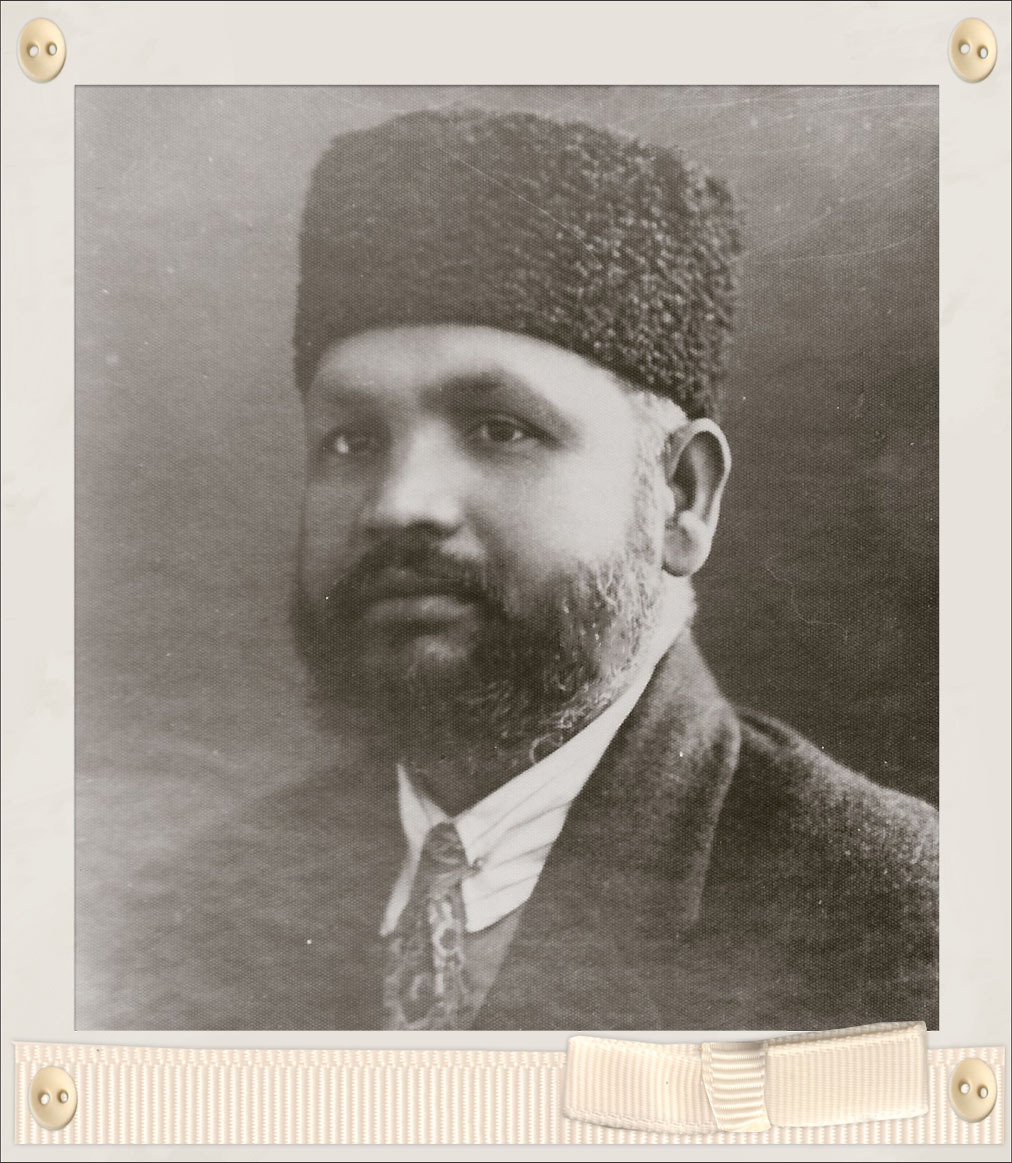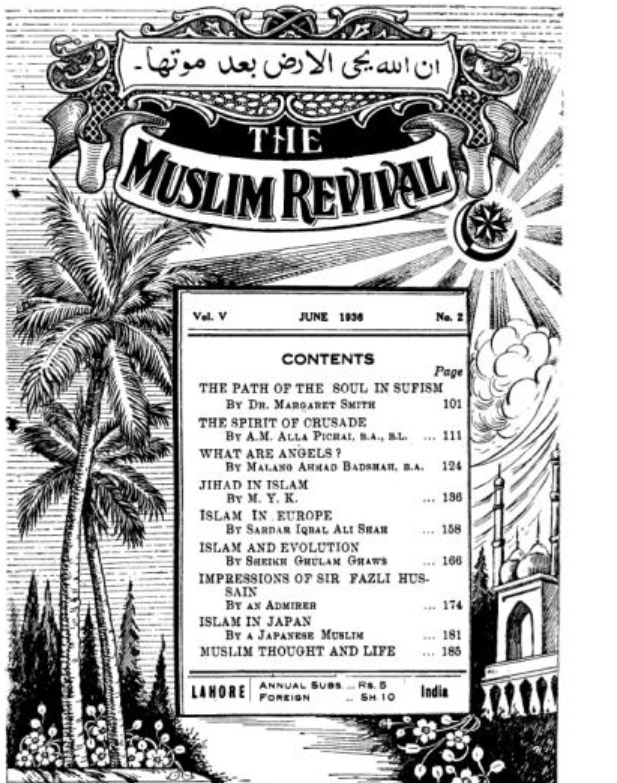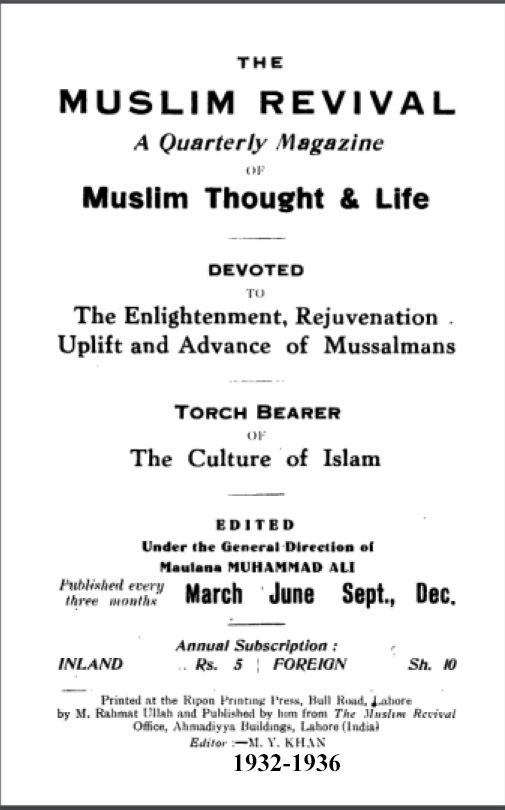Eid-Ul-Azha Sermon September 1923
By Mohammad Yakub Khan
Imam of the Shah Jahan Mosque
Woking, England.
(1921-1923)
The Religion of Self-Sacrifice
“Say: My prayer, my sacrifice, my life and my death are all for Allah, the Lord of the Universe.” – The Holy Qur-àn, vi. 168.
ISLAM is a message of peace and goodwill to humanity. Islam, of all religions, has extended the hand of fellowship to every other religion. The present occasion is one concrete illustration of that feeling of respect and regard which Islam inculcates for others. The Jews, the Christians and the Muslims all trace their religion to Abraham, but of all these it is the Muslims alone that to this day venerate the name of the Patriarch. Thousands of years ago the promise of the Lord came to Abraham:
“AND I WILL MAKE OF THEE A GREAT NATION, AND I WILL BLESS THEE, AND MAKE THY NAME GREAT; AND THOU SHALT BE A BLESSING.” (Genesis xii. 2.882)
It is in Islam and Muslims that this Divine promise finds daily fulfilment, bearing testimony to the fact that if any people are to-day the true descendants of that Great Patriarch they are none other than the followers of the Great Prophet of Arabia. Why, who but the Muslims daily bless his name? The four hundred million children of Islam send their benedictions on Abraham thirty-two times a day in their daily prayers. Again, if there exists another standing monument to that Great Patriarch, that too exists among the Muslims. It is not the Jews, it is not the Christians, who alike claim Abraham to be their forefather, but the four hundred million followers of Islam, scattered all over the surface of the earth, that celebrate this day the Grand Sacrifice of Abraham. Like the rest of the world of Islam, we Muslims in these British Isles, have assembled to pay homage to that great name. What could be a greater step than this towards mutual fraternization? The Jews and the Christians, the progeny of the same forefathers – Islam embraces them all as brethren. But this is not all. Islam goes a long way further to promote harmony and goodwill between man and man. It is not the Patriarch alone that Islam enjoins to venerate. Every other prophet is likewise hailed as a true prophet from the Lord, and a Muslim is enjoined to have faith in them, one and all. Could you point in the whole of religious literature of the world to anything more liberal, more charitable, more noble and more sublime? Yes, it is the Qur-àn, and the Qur-àn alone, that proclaimed as early as thirteen centuries ago:
“SAY: WE BELIEVE IN THE LORD AND IN THAT WHICH HAS BEEN REVEALED TO US AND IN THAT WHICH WAS REVEALED TO ABRAHAM AND ISHMAEL AND ISAAC AND JACOB AND THE TRIBES, AND IN THAT WHICH WAS GIVEN TO MOSES AND JESUS, AND IN THAT WHICH WAS GIVEN TO THE PROPHETS FROM THEIR LORD; WE DO NOT MAKE ANY DISTINCTION BETWEEN ANY OF THEM, AND TO THE LORD DO WE SUBMIT.” (The Holy Qur-àn, ii. 186)
Rummage the pages of the world-scriptures, the scriptures of the Jews and the Christians, of the Hindus and the Buddhists, the teachings of Confucius and of Zoroaster, and you will search in vain of a teaching so cosmopolitan. If only this feeling of regard towards world-religions on the part of Islam were reciprocated, much of the strain and tension that has all along put man asunder from his brother man will cease to a great extent. I as a Muslim venerate Jesus; it is but fair that a Christian should show equal respect for my Prophet. I venerate Moses; why should a Jew grudge me equal consideration? With me, Krishna too was a Holy Reformer, and if only our Hindu neighbours in India had the same charity of heart to extend to our Prophet ﷺ, much of the bitterness and friction that we find at the present moment to be stumbling-block in the way of a great and United India will be removed. On its own part, Islam has left no stone unturned to draw humanity into a closer bond of fellowship. But alas! Humanity is yet to make up a long way to come up to the Islamic breadth of view. Nevertheless, the day must inevitably come, though by degrees painfully flow, when this broad principle of Islam will be found to be an indispensable corner-stone to construct the world-fraternity of man and man.
This, however, is not all. This is but one principle of Islam that tends to promote sweeter relations between the various elements of humanity. Take any other branch of this universal religion and you will find the same current of purpose underlying it. To confine myself to the present institution of sacrifice, I may say that, in a symbolic way, it sums up the whole of the religion of Islam. If I were asked to epitomize the whole of the religion in one word, I would simply say, “Islam is sacrifice”: and so says the Great Prophet of Arabia in the following eloquent worlds: –
“SAY: MY PRAYER, MY SACRIFICE, MY LIFE AND MY DEATH ARE ALL FOR ALLAH, THE LORD OF THE UNIVERSE.”
This is the summum bonum of Islam – everything of man for the service of the Lord, which means service to His creatures. A little consideration will show that this gives no small impetus to widen the outlook of man and broaden his sympathies. Various people have various ideals, and those ideals are mainly responsible for giving shape to their respective characteristics. The “superman” of Germany was to be one who could thrust his will on others, irrespective of all consequences. And today the love of country constitutes, for all practical purposes, the highest standard of virtue. Islam, too, holds patriotism as a great virtue.” Love of country,” says the Prophet, “is of the very essence of faith.” But surely the self-seeking patriotism of the West is not the patriotism of Islam. This narrow patriotism has been responsible for no small amount of misery and woe to mankind. Nations running at the throats of nations for self-aggrandizement – this is the grim outcome of this cult – the stronger violating the sacred rights of the weaker without the least compunction. Then there is the race ideal. The supremacy of the white races must be maintained at all costs, regardless of all consequences to the rest of humanity. Nothing could be more inhuman; and strange to say, the apostle of this gospel are those that call themselves the followers of one who proclaimed from the mountain: “Love thy neighbour as thyself.” All these and similar low ideals have been eating like a cancer into the heart of humanity. Islam deals a death-blow to all such self-centred ideals. It places before humanity the highest of ideals – the sacrifice of all in the way of the Lord. Islam knows no aggressive nationalism. It regards the whole of humanity as one nation, the children of one God, the denizens of one globe. A Muslim owes his allegiance to naught else but the Lord. He can allow nothing to come between him and his Lord, neither his kith nor his kin nor his friend nor foe. He is brought up not only to the Love-thy-enemy ideal, but is also taught to shun his friend if that friendship should, in any way, clash with his love for the Lord. Thousands of years ago, when the world was yet in the grip of ignorance and superstition, Abraham stood for this Grand Truth. “Resign thyself,” came the Divine call to him, and without any reluctance he said, “I resign myself to the Lord of the Universe.” In the way of Truth, he did not hesitate to sever his connection with his friends and relations. Even with the king of the time he had an argument, and had the courage to tell him to his face that it was the Lord to whom the prince and the peasant must alike bow. And then came the most crucial of the tests. At the old age of ninety-nine he found himself called upon in a vision to offer his own son as a sacrifice. He did not shrink. With a heart resigned to His will, he was on the point of fulfilling his vision, which he interpreted literally, when Divine revelation came, putting a stop to the long-prevalent superstitious practice of human sacrifice. It is for that unquestioning resignation to the will of the Almighty that Abraham to this day occupies a place of honour in the hearts of millions of humanity. Centuries rolled by, and we fine another true Muslim demonstrate this true spirit of Islam on Calvary. It was Jesus, the Muslim of Nazareth. In submission to the will of the Lord he wore the crown of thorns and, with Abraham-like resignation, went to the cross when the will of the Lord so ordained it; and to-day he enjoys, in consequence of that genuine sacrifice, the love and esteem of millions of Christians and millions of Muslims. These are the blessings that flow in the wake of every sacrifice, however insignificant. Why, a tiny seed sacrifices itself, loses itself in the dust, surrenders itself to the will of the Creator, and in due course we find Divine grace come to reward that bit of sacrifice beyond all calculation. A mighty oak is but the outcome of sacrifice on the part of the tiny acorn, and so is a sweet rose of a delicious apple the product of some such act of self-effacement on the part of a little seedling. What wonder, then, that Islam, which is but another name for submission to the laws pervading this universe, should inculcate the same principle. In this lies the good of the individual, the good of the community, and the good of humanity at large.
The life of the Prophet Muhammad ﷺ is a practical commentary on this truth. “My life and my death “he exclaimed, “are for Allah, the Lord of the Universe,” and he lived up to it in the varying vicissitudes of his life. Nothing swerved him from this course. In hardest times, as well as in times of ease, his one attachment was for the Lord. When rejected and persecuted, he was unflinching in his devotion to Him. “Should you place the sun,” was his noble and daring reply to his uncle, who would dissuade him from his mission, “on my right hand and the moon on my left, I shall not give up my life-mission until it has succeeded or I perish in the attempt.” But when times changed and fortune smiled on him, his devotion to the Lord was none the less whole-hearted. The spiritual and temporal king of Arabia, he would yet cobble his own shoes, mend his own clothes. From the very zenith of grandeur and glory he proclaimed in all humility that he was but a man like unto the rest of men. On his death-bed he asked if he owed anyone anything or if he had to compensate for any injury he may have caused anybody. “Better ashamed in this life than meet the Lord ashamed.” But his last words are perhaps the purest that have ever dropped out of dying lips: “My Lord: The Companion on high! My Lord: The Companion on high!”
This is Islam, the religion of sacrifice. Our low sordid desires and passions, we must learn to sacrifice in obedience to the call of Higher Truth. Through this sacrifice of self lies the sole way to heaven. Hard though in doing, there is no getting away from it. This happens to be the rule of this game of life, and that we may play our part therein to our honour, the sooner we squarely face this hard reality, the better. This is no idealistic teaching, no counsel of perfection. It is a matter of history, and you have but to refer to the history of Islam to see how rich it is in deeds of self-sacrifice in the cause of Truth. Selfless sacrifices in the cause of Truth are not impracticable, even in this age of ours. Why, what tremendous sacrifices were made by the West in the recent war – sacrifices in men, in money, and what not – and all that in the furtherance of national interests! Much more, therefore, is humanity capable of displaying that spirit of sacrifice when the motive is a still higher one – the furtherance of the good of humanity.
It is only a matter of outlook, and if it has been possible to bring up individuals as citizens of this or that nationality, why not as of the Universal Nation of Mankind? Islam aims at that ideal. Universal brotherhood of man is even to-day a reality, perhaps a bit baffling to Western material-mindedness. The East and the West are already meeting, in spite of the pessimist, all differences of race, colour, language, class or birth sinking into insignificance. In this congregation to-day may be seen a visible proof of that. Here you have a representative gathering; the Indian, the Egyptian, the Arab, the Persian, the Afghan, the Turk, the African and the English – all bowing and kneeling, shoulder to shoulder, to the same God, in a true fraternal spirit. Our brother Alfarooq Lord Headley, who is to-day in Mecca, adoring, with the rest of the world of Islam, the one common God of humanity, is giving the lie to all believers in the pessimistic “never” of Kipling. As a message from the Cairo correspondent of an English daily paper puts it, he was accorded in Egypt, while on his way to Mecca, a reception unprecedented in the case of a Britisher. Another English brother of ours, who has recently returned from his tour to Morocco, writes that he was welcomed in the tents of the Moors wherever he went, and that he felt at home in their midst even after a brief stay of but a few hours. This is no myth, no make-believe, Islamic fraternity is a vital force which has its roots too deep to be shaken by the varying fortunes of life.
What else, after all, may I ask, is the Kingdom of Heaven for which Jesus prayed? It is no other than a human society such as this – a society in which individuals are cemented to individuals, nations to nations, races to races, in the Divine bond of goodwill and love. If you would see peace and prosperity reign in the world, if you would have the millennium realized – in fact, if you would have Jesus Kingdom of Heaven come on earth as it is in heaven – there is only one way to do so; the way of self-surrender to the Will of the Lord. That is the sole doorway through which every would-be denizen of that kingdom must pass – the doorway of self-sacrifice, self-crucifixion, or, to speak in Arabic, of Islam. Let your life be for the Lord and for the Lord your death. Truth before the world, God before all – let that be your watchword, and yours is the Kingdom of Heaven.
English Press on Eid Celebrations
“Peace Be to All,” Says Imam.
“Peace be to all! Peace be to all!” The sonorous tenor voice of the present head of the Muslims in this country, Maulvi Mohammed Yakub Khan, rang out like the clear note of a bugle in the shimmering mosque at Woking – the only one in England – sending back a dim, whispering echo, and two hundred faces – black, brown and white – lighted up for a moment into something like ecstasy. Four hundred million of the children of Islam were yesterday, throughout the world, paying homage to the memory of the Patriarch Abraham in an annual festival known as Eid-ul-Azha. (Morning Post, England)
(The Islamic Review, September 1923)
Courtesy aaiil.org





